- Home
- Holly Black
The Modern Faerie Tales Page 61
The Modern Faerie Tales Read online
Page 61
“I made you something,” Kaye said, pulling out the bracelet of green braid wrapped in silver wire.
“This is your hair?” he asked.
“It’s a token,” Kaye said. “Like from a lady to a knight. For when I’m not around. I was going to give it to you before, but I never quite got around to it.”
He ran his fingers over it and looked at Kaye, astonished. “And you made it? For me?”
She nodded, and he held out his hand so she could clasp it on him. His skin felt hot to the brush of her fingers.
Across the water, along the shore, fireworks went off. Streaks of fire ballooned into carnations of light. Golden explosions rained around them. She looked over at him, but he was still looking at his wrist.
“You said it was for when you’re not around. Will you not be around?” he asked her when he looked up.
She thought about the owl-eyed faerie in Silarial’s court and what he’d told her. They say that nameless things change constantly—that names fix them in place like pins. Kaye didn’t want to be fixed in place. She didn’t want to pretend to be mortal when she wasn’t, nor did she want to have to leave the mortal world. She didn’t want to belong to one place or be one kind of thing.
“How will you rule both courts?” she asked instead of answering his question.
Roiben shook his head. “I’ll try to keep one foot on each side, balance on the knife edge between both courts for as long as I can. There will be peace so long as I can hold them. Provided I don’t declare war on myself, that is.”
“Is that likely?”
“I must confess to a good deal of self-loathing.” He smiled.
“I was thinking of opening a coffee shop,” Kaye said quickly. “In Ironside. Maybe help people with faerie problems. Like Luis does. Maybe even help faeries with faerie problems.”
“You know I just made a very advantageous bargain predicated on the fact that no faerie wants to live in the city.” He sighed and shook his head as if he’d just realized that arguing with her was useless. “What will you call your coffee shop?”
“Moon in a Cup,” she said. “Maybe. I’m not sure. I was thinking that maybe I could move out of my grandmother’s—spend half my time working in the shop and half my time in Faerie, with you. I mean, if you don’t mind me being around.”
He smiled at that and it seemed like a real smile, with no shadows at the edges. “Like Persephone?”
“What?” Kaye leaned in and skimmed her hand under his coat, tracing the vertebrae of his back. His breath hitched.
Roiben let his hand fall lightly, hesitantly, across the wings of her shoulders. He sighed like he’d been holding his breath. “It’s a Greek story. A human one. The King of the underworld—Hades—fell in love with a girl, Persephone. She was a goddess too, the daughter of Demeter, who controlled the seasons and the harvests.
“Hades stole Persephone away to his palace in the underworld and tempted her with a split-open pomegranate, each seed shining like a ruby. She knew that if she ate or drank anything in that place she would be trapped, but somehow he persuaded her to eat a mere six seeds. Thereafter, she was doomed to spend half of each year in the underworld, one month for one seed.”
“Like you’re doomed to spend half your time dealing with the Bright Court and half with the Night Court?” Kaye asked.
Roiben laughed. “Very like.”
Kaye looked at the far shore, where fireworks still heralded the new year above the jagged teeth of buildings, and then toward where Corny and the others blew noisemakers and drank cheap champagne from plastic goblets.
She slid out of Roiben’s arms and whirled on the sand of the beach. The wind blew off the water, numbing her face. Kaye laughed and spun faster, gulping the cold briny air and smelling the faint firework smoke. Pebbles crunched under her boots.
“You still haven’t told me,” he said softly.
She stretched her arms out over her head, then came to an abrupt halt in front of him. “Told you what?”
He grinned. “How you managed to complete the quest. How you claimed to be able to lie.”
“Oh. It’s simple.” Kaye lay down on her back on the snowy beach, looking up at him. “This is me,” she said, her voice full of mischief as she reached out with one long-fingered hand. “I’m a faerie that can lie. See? This is me lying.”
Turn the page to read
THE LAMENT OF LUTIE-LOO
A NEW SHORT STORY SET IN THE REALM OF FAERIE
Lutie was about the height of a large mug of tea. Or a pencil that had been sharpened a few times. Or a paperback book that could be tucked into a purse.
Small enough to hide in Kaye’s hair. Small enough to not quite fit in fashion doll clothes unless she altered them with needles the length of her arm. Small enough to be thought of as utterly, completely inconsequential. Because of her size, from the moment she was born, tumbling from a flower and still slightly fuzzy with pollen, Lutie-loo was never given an important job. Just one silly errand after another.
When Silarial had sent her to the Unseelie Court with Spike and Gristle and the Thistlewitch, Lutie thought her fortunes were changing. The way the Lady had spoken of the task, it had seemed so important! But watching over Kaye, a child ignorant of her own magic, was barely even babysitting. It certainly wasn’t a quest.
And sure, Kaye had turned out to be wild as her pixie blood, twice as clever, and three times as headstrong. She’d wound up responsible for the death of Silarial . . . and the overturning of two courts. But that definitely hadn’t been part of the plan. And it wasn’t because of anything Lutie had done.
Now Lutie was an honored member of Roiben’s Court. She wanted for nothing. And nobody wanted her to do anything either. She was just expected to sit on her duff, drink dew from petals, and overlook how no member of the Gentry saw her as anything more than an oversize and slightly more intelligent bug. And, of course, most mortals didn’t see her at all.
“I just need to find Ethine, and then I can ask her what her problem is,” Kaye said. She was sitting on a stool in the back kitchen of her coffee shop, Moon in a Cup, looping glittery green laces through the eyelets of a pair of Doc Martens. “I guess I can understand why she was angry—but it wasn’t his fault! She has to have realized that by now.”
Lutie buzzed sympathetically, alert to the possibility that maybe finding Ethine was something she’d be good at. After all, Lutie could talk to people. She could ferret out information. And she wasn’t likely to get into as many arguments as Kaye would. This would be a good job for her. “Maybe I could find her. Maybe.”
But Kaye wasn’t paying attention. “Silarial ordered her to fight Roiben. Even though Ethine had no idea how to use a sword and was going to die if Roiben fought back. And if Silarial had gotten her way and Roiben decided to sacrifice himself, Ethine would have had to kill her own brother. Maybe she would have blamed him for that too.” Kaye shoved her foot into the boot, slamming it against the tiled floor with the force of her anger.
Kaye lived in New York, despite the iron and the iron sickness that came with it. The last time she visited Roiben, she’d redecorated his throne room, throwing out a dozen hideous and doubtless treasured Unseelie objects over the protests of his councillors, including many bloodstained textiles and a mouse-skin rug. Kaye didn’t understand leaving things well enough alone. She never had. Once, Lutie had watched the Thistlewitch instruct Kaye not to take off a protective glamour. Kaye immediately went and did exactly the thing she’d been forbidden from doing.
Lutie loved her, but Kaye was not a reasonable creature. She certainly couldn’t understand someone like Ethine, who seemed like she just wanted all her problems to go away.
“Ethine is proud,” Lutie said. “Proud and sad and dull.”
Kaye made a face. “If I just explained . . .”
Lutie could picture Kaye running around Faerieland, accidentally overthrowing governments and causing one huge scene after another. Lutie was sure Roiben woul
d not like that, especially if it got his sister even angrier with him. But maybe Lutie could find Ethine herself and arrange the meeting. It was true that a great court lady like Ethine was probably no more interested in what a sprite had to say than a pixie, but all the Gentry loved protocol. And a messenger would make everything more formal. Besides, if Ethine was totally against speaking to Kaye, at least Kaye would go in forearmed. Or be persuaded not to go at all.
Lutie cleared her throat to make her suggestion again. “I could look for her.”
Kaye gave her an evaluating look. Lutie flew in place, attempting to look competent. And larger.
“No,” Kaye said finally, shaking her head. “It’s too much of a bother for you.”
“I can do it!” Lutie said, rather more sharply than she’d intended.
Kaye appeared surprised. “I am sure you could.”
“It will be my mission,” said Lutie. “I will do deeds of daring!”
Kaye’s green eyebrows rose. “I hope not. But if you really want to go, then fine. I bequeath this annoying quest to you. Find Ethine and bring word to me of her whereabouts, and possibly news of what crawled up her ass to make her such an awful—”
“Yes!” Lutie said, zooming through the air joyfully. “I will find the sister. I will arrange everything!”
Kaye grinned up at her. She said she believed Lutie could do it, and Kaye could no more lie than any of the Folk. Lutie felt a burst of hope. If she could pull this off, not only would it make Kaye happy, but Lord Roiben would be pleased too. Perhaps the gloomy King of the Court of Termites would cheer up and grant her a medal or a hollow tree to call her own. And perhaps he’d send her on an even more important quest.
It took her all day to assemble and pack the things she thought she might need—a long steel pin tucked into a leather sheath, to serve as a sword; doll gowns and a few other items filched from a dollhouse, jammed into a velvet gift bag she was using for a rucksack; and three organic single-origin chocolate-covered coffee beans, for energy.
Then she realized she had no idea how to find Ethine. She was sure she could. But that didn’t mean she had the first idea how. So she pondered and she pondered and she ate one of the chocolate-covered coffee beans.
It was very late when she found herself flying above the stump of a tree beneath the Manhattan Bridge. She tried to find something optimistic in the way the roots had cracked up through the pavement before humans had chopped the tree down, but it was hard.
She slid through a window and flew inside, to the waiting room of the potion-maker and alchemist for the solitary fey of New York. Ravus the troll lived here. She knew him because he’d once been part of Silarial’s court and because he had a human companion who’d been one of Kaye’s roommates. As she recalled that, she also realized she wasn’t sure how much time had passed since then. What had happened to the girl? Lutie couldn’t remember.
Ravus had been exiled from Silarial’s court, she knew that. He’d been at court when she had, although their paths hadn’t crossed. He was just so huge that being around him scared Lutie. He could crush her easily, absentmindedly, in the swat of one giant hand.
But because he was the maker of a powder that allowed the Folk a resistance to iron, many solitary fey and even Gentry visiting the cities came to see him. Everyone used the powder, even Lutie. It made living near the iron bearable. Maybe Ethine had been one of them. Or maybe he’d heard a rumor.
Lutie was hoping. And she was further hoping he’d be friendly about it. And not ask for too much in exchange for the information.
There was a little bell near the door to Ravus’s chambers. She rang it and waited nervously as the tinkling sound echoed through the dark.
A few minutes later, a large wooden door creaked open, a sliver of light spilled out, and there was a heavy tread on the floor. Ravus appeared, his skin a green that looked a bit sickly in the gloom. Lutie’s tiny heart sped like the whir of hummingbird wings.
“Welcome,” he said in his deep voice. “What is it you seek?”
“A courtier,” Lutie told him, darting past and into his workroom. “Lord Roiben’s sister.” A long wooden table was laden with ingredients—dry snakeskins; tiny pale bones; and stoppered and waxed glass bottles of many different shapes, bearing labels in the troll’s looping hand. The first tag read: LAST HOPE OF A HEART.
The room she’d entered was very tall, with a loft suspended above her. She could see a bed with disarranged sheets and one pale leg sticking out, bare to the thigh. Too pale, Lutie thought. Was it a dead body? Lutie rose a little without quite meaning to. Then the person on the bed turned over in sleep. For a moment, Lutie was relieved. The paleness was only moonlight. But a moment later she noticed the distorted shape of the girl, with an abdomen like that of an enormous spider.
What had he done to her? Was it some kind of alchemical experiment?
“I don’t have your courtier hidden among my poultices,” Ravus said, pitching his voice low. “But come have some tea and I will see what I can recall.”
He already had a cup for himself poured, she realized when he freshened it. Then he took down a thimble from one of his shelves and filled it with tea from the same steaming pot. “There are biscuits around here as well, if Val hasn’t eaten them all.”
Val. Valerie. That was the girl’s name. She remembered now. With hair like a copper penny.
Ravus brought a plate over to the table, along with a cup, which he turned over to make a sprite-size stool. Lutie sat, holding her thimble much as one might hold a pail. The scent that wafted up to her nose was a delicious blend of elderflower and nettle. The cookies piled on the plate appeared to be studded with rosemary. But Lutie couldn’t help a nervous glance toward the loft.
“Ethine left,” she said, trying to focus on her mission.
Ravus nodded. “Stomped off in a huff, isn’t that right?”
“Yes, and Kaye wants her back.” Lutie took a sip of the tea. “She thinks Roiben is sad.”
Ravus grinned, showing too-long canines. “The fearsome Lord of Termites? I never imagined him anything so ordinary.”
Lutie buzzed in understanding. Sometimes it did seem like when Kaye talked about Roiben, she was attributing nuanced emotions to a handsome murder-loving murderer. “But you do know where she is?”
“I do, as a matter of fact,” he said. “Ethine came to a friend of mine for a potion to change her hair. She didn’t want to glamour it because she was going to the High Court, where they’d be very likely to see through any magic. And the silver is so distinct. After all, it’s the same as his.”
“The High Court?” Lutie squeaked. She didn’t like that, not one bit.
“No one wants to storm off to serve a lesser court,” Ravus observed mildly.
Lutie finished her tea disconsolately. The High Court of Elfhame, where High King Eldred ruled, had been collecting lower courts since the time of Queen Mab. It was said that they made you swear not to the royals themselves, but to a crown that never broke. So far, they hadn’t marched on Roiben, but she was sure they would very much like for him to pledge his fealty to the High Court and bring a large chunk of the East Coast into their fold. They were scary.
And it meant that Lutie would have to fly over the sea to the isles of Elfhame. She hated flying great distances, especially over water. There was nowhere to land when her wings got tired, and birds and fish often thought she’d make a delicious snack until she showed them otherwise. But that was an obstacle—and all quests had obstacles. She could overcome them, she was sure of it.
There was a creak on the stairs. The girl—no, a woman now, with the same copper penny hair that Lutie remembered—was coming down, in what appeared to be an oversize band shirt stretched over her enormous abdomen and fuzzy slippers. “Is someone there?” Val called.
“I better be off,” Lutie squeaked. Kaye wasn’t going to like to hear what had become of her friend.
“Did we wake you?” Ravus asked Val, smiling warmly at
her. Surely he wouldn’t look at her like that if he was the cause of her suffering.
The woman shook her head and yawned. One hand went to her belly. “Heartburn.”
And something about the gesture made Lutie finally recognize what was wrong with Valerie. Or not wrong at all. She was pregnant.
Faeries didn’t reproduce often or easily, not like mortals. And while Lutie had seen pregnant human women before, there was something somewhat shocking about thinking that a mortal was carrying a faerie child. But it was still embarrassing that she’d thought all those things about Ravus.
Lutie fled.
At Fisherman’s Wharf, she stared out at the water, reassuring herself. Her quest was going well, she thought. Once she got to Elfhame, it wouldn’t be hard to find Ethine in the High Court, and then no matter what she said, Lutie could come right back—job complete! Really, it wasn’t even that hard of a job. She could handle much worse. With that happy thought in mind, she snuck into a dollar store, where she filched both a plastic saddle for a toy horse and a ball of yarn. Then she startled a seagull awake. It snapped its beak in her direction immediately. Jumping back, she lifted her hands and spoke in the language of birds. “Do my bidding. Bear me on your back and fly me wheresoever I say.”
It stopped attacking, and Lutie threw her makeshift harness onto its back.
She could totally handle this job! Everything was going just fine.
The gull hurtled up toward the stars with a great cry. On its back, the journey was swift and sure, carrying her away from the lights and metal stink of Manhattan, out over the waves. It wasn’t long before she spotted the three isles—Insmear, Insmire, and Insweal—shrouded in fog, their hills and valleys an emerald green never to be found in the mortal world. Despite herself, her heart gave a little leap. Here was a place only for the Folk, thick and heavy with enchantment. As the gull flew closer, even the scent of the air made her giddy. It was a feeling she’d only had before at Silarial’s court, the feeling of coming home.

 The Wicked King (The Folk of the Air #2)
The Wicked King (The Folk of the Air #2) Valiant
Valiant The Coldest Girl in Coldtown
The Coldest Girl in Coldtown The Darkest Part of the Forest
The Darkest Part of the Forest Tithe
Tithe White Cat
White Cat Red Glove
Red Glove The Cruel Prince
The Cruel Prince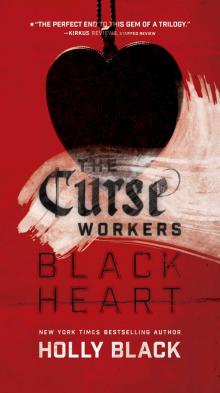 Black Heart
Black Heart Doll Bones
Doll Bones Geektastic: Stories from the Nerd Herd
Geektastic: Stories from the Nerd Herd Zombies Vs. Unicorns
Zombies Vs. Unicorns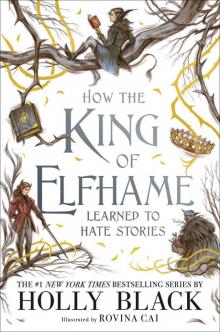 How the King of Elfhame Learned to Hate Stories
How the King of Elfhame Learned to Hate Stories The Poison Eaters and Other Stories
The Poison Eaters and Other Stories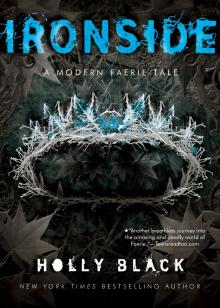 Ironside
Ironside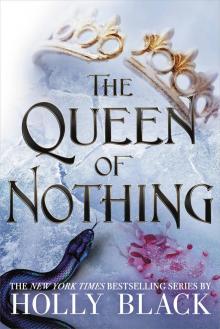 The Queen of Nothing
The Queen of Nothing Modern Faerie Tales
Modern Faerie Tales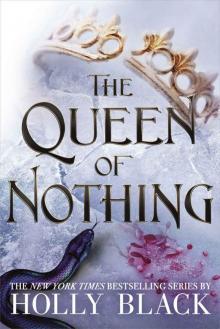 The Queen of Nothing (The Folk of the Air #3)
The Queen of Nothing (The Folk of the Air #3) The Modern Faerie Tales
The Modern Faerie Tales Heart of the Moors
Heart of the Moors The Golden Tower
The Golden Tower Tithe mtof-1
Tithe mtof-1 Ironside mtof-3
Ironside mtof-3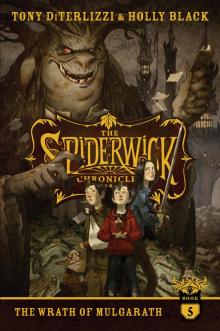 The Wrath of Mulgarath
The Wrath of Mulgarath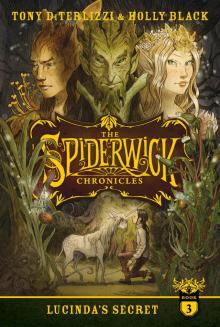 Lucinda's Secret
Lucinda's Secret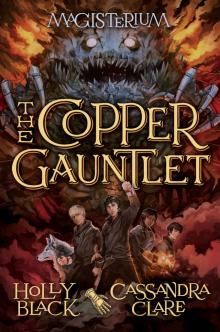 The Copper Gauntlet
The Copper Gauntlet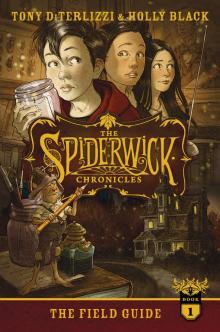 The Field Guide
The Field Guide Valiant mtof-2
Valiant mtof-2 The Lost Sisters
The Lost Sisters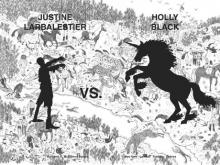 Zombies vs. Unicorns
Zombies vs. Unicorns Bad Seeds: Evil Progeny
Bad Seeds: Evil Progeny Red Glove (2)
Red Glove (2) Notebook for Fantastical Observations
Notebook for Fantastical Observations The Iron Trial
The Iron Trial Welcome to Bordertown
Welcome to Bordertown